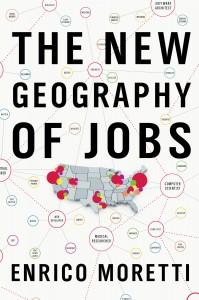 Enrico Moretti first became interested in economics as a high school student with a passion for environmental policy, drawn to the field's practical nature and real-world relevance. "Making an argument based on moral grounds is useful," he said, hanging out in the offices of Houghton Mifflin Harcourt during a recent visit to New York City. "But being able to make an argument based on economic grounds is even more useful."
Enrico Moretti first became interested in economics as a high school student with a passion for environmental policy, drawn to the field's practical nature and real-world relevance. "Making an argument based on moral grounds is useful," he said, hanging out in the offices of Houghton Mifflin Harcourt during a recent visit to New York City. "But being able to make an argument based on economic grounds is even more useful."
As he went on to college in his native Italy and then to graduate school at U.C. Berkeley--to which he returned as a professor in 2004--Moretti began to concentrate his attention on labor markets and the role of education in economic prosperity--a field of study that has culminated with the publication of The New Geography of Jobs. Why do some cities thrive while others remain economically stagnant? Since the 1980s, he argues, the average education of the local workforce has been the best predictor of a city's economic success. When a well-educated workforce is combined with local centers of innovation and research, a new cluster of prosperity can develop: think Hollywood 100 years ago or Silicon Valley and Seattle in the 1990s.
 The problem is that these factors are not distributed evenly across the United States. As a result, Moretti warned, "we're not just one nation, we're several nations, and we're drifting apart." Education reform is one solution to this "Great Divergence," but it's not enough. (Consider Santa Barbara, for example: great universities, a perfect climate and an excellent cultural scene, but, he notes, "an economy that hasn't generated any jobs outside tourism in decades.") Local economies need to learn how to be flexible, to adjust as industries wax and wane. Otherwise, he said, they could meet a fate similar to Rochester, N.Y., or Detroit, Mich.
The problem is that these factors are not distributed evenly across the United States. As a result, Moretti warned, "we're not just one nation, we're several nations, and we're drifting apart." Education reform is one solution to this "Great Divergence," but it's not enough. (Consider Santa Barbara, for example: great universities, a perfect climate and an excellent cultural scene, but, he notes, "an economy that hasn't generated any jobs outside tourism in decades.") Local economies need to learn how to be flexible, to adjust as industries wax and wane. Otherwise, he said, they could meet a fate similar to Rochester, N.Y., or Detroit, Mich.
Subsidizing innovative start-up companies is one way to grow a new prosperity center, but as the controversy over federal loan guarantees to the failed solar energy developer Solyndra demonstrates, government funding won't ensure success. "It's hard to know what the next big thing is," Moretti said, "even for those whose job it is to do that." Venture capitalists spend their professional lives looking for the best start-up investments, and even they get it wrong plenty of times. "So the best industrial policies that we can come up with for the U.S. today are probably not choosing one industry over another, but investing in clusters and investing in research and development."
One solution that Moretti takes issue with is the notion, popularized by authors like Richard Florida, that cities can spur economic growth by attracting a "creative class" of workers. "Coolness and sexiness are a great thing for cities," Moretti said, "but they won't necessarily generate good jobs." He cited Berlin as an example of a city that attracts plenty of talented people, but hasn't seen the expanded job market to match. By contrast, he proposes, an innovation cluster will not only create jobs in the originating industry, but also lead to the ancillary jobs--including "creative" positions--that emerge to provide local services.
The New Geography of Jobs is Moretti's first work for general audiences after years of writing for fellow economists. "Our careers depend almost exclusively on the papers we write and the intellectual impact they have on the profession," he said. "After 18 years thinking about these questions, I felt an incredible urge to reach a broader audience." He enjoyed writing in a new voice ("dealing with the meat of the problems") and, though unimpressed by Paul Krugman's current op-ed writing, he drew inspiration from the Nobel laureate's earlier work, especially the 1995 book Peddling Prosperity. "His books from the 1980s and '90s were an example of how to take complicated economic ideas, and make them compelling to a general reader," Moretti said. "He didn't back down from the technical issues, but described things in a deep way."
Moretti has also been reading Steve Jobs, the biography by Walter Isaacson, and finding a lot in it relevant to his own theories about innovation systems. The emphasis on close collaboration among highly talented individuals, and the belief that good ideas are never born in a vacuum, is also essential to understanding Moretti's own relationship with the Berkeley economics department, which he describes as "probably one of the best places to do the type of research I'm interested in." After his book tour, Moretti will continue his research on labor markets, particularly the influence of policies intended to spur growth in specific locations--another example of how, he said, "economics is one of the most powerful lenses we have for interpreting our current reality." --Ron Hogan

